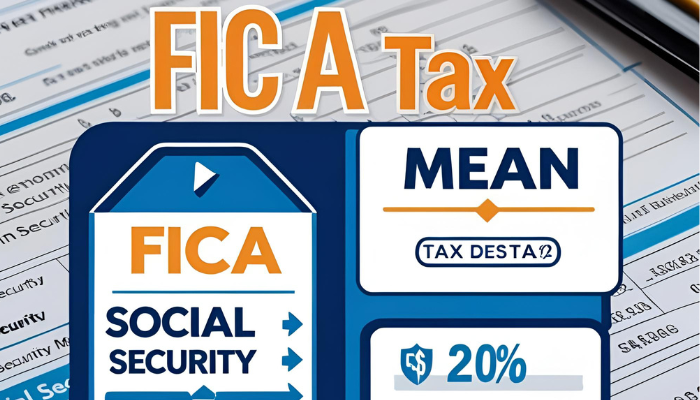
Who is Tax Financial Advisor?
The matters of taxation can be very confusing, making your mind revolve around how to file for a tax return, who is Tax financial advisor, or whom to look for reliable advice. It is natural to worry about such matters in the looming tax session. Still, consistent checks and balances throughout the year can help you be more confident of your individualized or company’s financial situation.
Both the terms tax financial advisor and financial tax advisor are used interchangeably. However, dividing this term into two can help you better understand so you can choose whether you need to hire a tax advisor or a financial advisor.
Tax Financial Advisors: What You Need to Know?
The most straightforward yet differentiating feature between a tax advisor and a financial advisor is that a tax advisor is always fully updated with the most recent knowledge and amendments imposed by the Internal Revenue Service (IRS). These professionals are essential assets to consult while filing for tax returns.
On the other hand, a financial advisor has the expertise to manage your finances by mapping out a congruent strategic plan. However, he may need a license to assist you in preparing tax returns.
Now that the essential difference between tax and financial advisors has been cleared, understanding who tax financial advisor is would become more accessible.
A tax financial advisor possesses proficiency in tax laws, financial planning, and accounting. The primary objective is to deduce a suitable financial plan for their clients, along with a keen focus on compliance with tax laws. An in-depth knowledge of tax codes, deductions, exemptions, and other complications is required to cope with individualized and business tax liabilities.
Difference Between Financial Advisor & Tax Advisor
Tax advisors are adept in advanced tax planning at local and federal levels and serve in bookkeeping and account keeping. They strive hard to earn the title and position of a certified public accountant (CPA). It is often misinterpreted that all CPAs can prepare tax returns because they have studied various subjects. However, only CPAs are authorized to give their opinion on the financial statements – it also includes balance sheets, income statements, cash flow statements, and related reporting.
In contrast, being recognized as a financial advisor requires passing the certified financial planner (CFP) exam. CFPs are licensed and authorized to set up accounts, such as individual retirement accounts (IRAs), and guide their clients to save and invest for a prosperous future.
Click here to learn more about how to become a tax advisor.

Who is Tax Financial Advisor & How to Choose the Right One?
Learning who is Tax financial advisor and choosing the right one that fits your needs are entirely different tasks requiring different abilities. Look for the following characteristics while selecting a reliable financial professional:
1. Tax Drafting
Developing a stable tax strategy is one of the fundamental roles of a financial tax expert. Analyzing the monetary situations and discussing clients’ short and long-term goals and current tax obligations helps devise a compelling set of actions that minimize the tax liability. It also helps identify eligible credits, tax deductions, and productive opportunities for fruitful investments.
2. Professional Deferment
Avoiding hefty penalties and legal prosecutions demands professional deferment and compliance with the state’s tax standardizations. Hiring corporate tax advisors and equipping your business with professional guidance right from the start saves a lot of time, money, and energy and, most importantly, secures your reputation in personal and professional aspects. Witnessing accuracy in the documentation process by availing expertise helps ensure that all the information is authentic and in unity with the latest tax codes.
3. Strategic Planning
Friendly tax advisors offer planned strategic advice to safeguard your prospective monetary circumstances and help you avoid the likelihood of financial dependency in the long run by providing ample guidance on investment choices, business morphology, estate, and retirement planning. Based on your goals, knowing who tax financial advisor is paramount so they can pave the most advantageous path that ensures a secure future.
4. Effectual Taxation
The key focus of financial consultants is to enhance the effectiveness of overall budgetary circumstances. They aim to reduce the payable tax amount by utilizing legal methods and leverage tax credits.
5. Risk Mitigation
Tax consultants provide information to help you stay proactive and informed about the ongoing regulations so you can stay safe from potential harm. Doing so reduces the risk of being vulnerable to penalties and positively impacts your organization’s financial growth.
Who benefits from a financial advisor?
A financial advisor can have a significant impact on your financial health. People often wonder “who benefits from the services of a financial adviser?” These professionals can provide valuable insight and assistance to a wide range of people.
A financial advisor can be a great asset to investors who are looking for personalized advice to navigate complex financial markets. A skilled advisor will tailor their strategies according to the needs of each client, whether they are planning retirement, managing investments or strategizing tax efficiency.
Those who are considering a DIY method may be satisfied with the results of managing their finances. The benefits of working with a financial adviser often go beyond their investment knowledge. Financial advisors can offer holistic planning that addresses areas such as risk management, estate plans, and wealth preservation.
Financial advisors provide a more personalized service than online tools and self-guided platforms. They interpret market trends, create strategies that are tailored to each client’s goals, and offer a unique perspective. This personalized approach is what sets financial advisors apart. They ensure that their clients get advice that’s tailored to them.
Some people may prefer not to use a financial adviser, but recognizing their nuanced benefits can help you achieve greater financial success and stability in the future. A skilled advisor is the guide that helps individuals navigate the complex world of financial decision-making.
A tax advisor or tax consultant is a person with advanced training and knowledge of tax law. The services of a tax advisor are usually retained in order to minimize taxation while remaining compliant with the law in complicated financial situations. Tax Advisors are also retained to represent clients before tax authorities and tax courts to resolve tax issues.
The Bottom Line
Your perceptions about who is tax financial advisor are understandable, which may also give rise to debatable concerns, including tax advisor vs financial advisor, which appears to be an evenly justified concept. Despite the provision of some overlapping services, financial and tax advisors in Texas are unique in their roles, having entirely different certifications with a labyrinthine understanding of the complexity of specialty-specific regulations.


